Analysis of Ethical Issues: Big Data in E-Commerce in UAE
VerifiedAdded on 2022/08/16
|19
|5490
|16
Report
AI Summary
This report provides a comprehensive analysis of the ethical issues arising from the application of big data in the e-commerce sector within the United Arab Emirates (UAE). It begins by defining information systems and big data, highlighting the benefits of big data analytics in e-commerce, such as predicting trends and enhancing customer service. The report then delves into the five moral dimensions of ethical issues: information rights and obligations, property rights and obligations, accountability and control, system quality, and quality of life. It identifies specific ethical challenges, including lack of transparency, privacy concerns, data ownership disputes, issues with consent for data usage, and data openness. Examples from UAE e-commerce companies are used to illustrate these ethical dimensions, such as consumer protection laws, privacy breaches, and data sharing practices. The report concludes by discussing ways to mitigate these ethical concerns, emphasizing the importance of data privacy, transparency, and ethical guidelines to ensure responsible use of big data in the e-commerce industry. The report aims to provide a balanced perspective on the advantages and ethical considerations of big data analytics, offering insights for businesses operating in the UAE.

Running head: BIG DATA IN E-COMMERCE
Ethical Issues in Information Systems in UAE
Name of the Student
Name of the University
Author’s Note:
Ethical Issues in Information Systems in UAE
Name of the Student
Name of the University
Author’s Note:
Paraphrase This Document
Need a fresh take? Get an instant paraphrase of this document with our AI Paraphraser
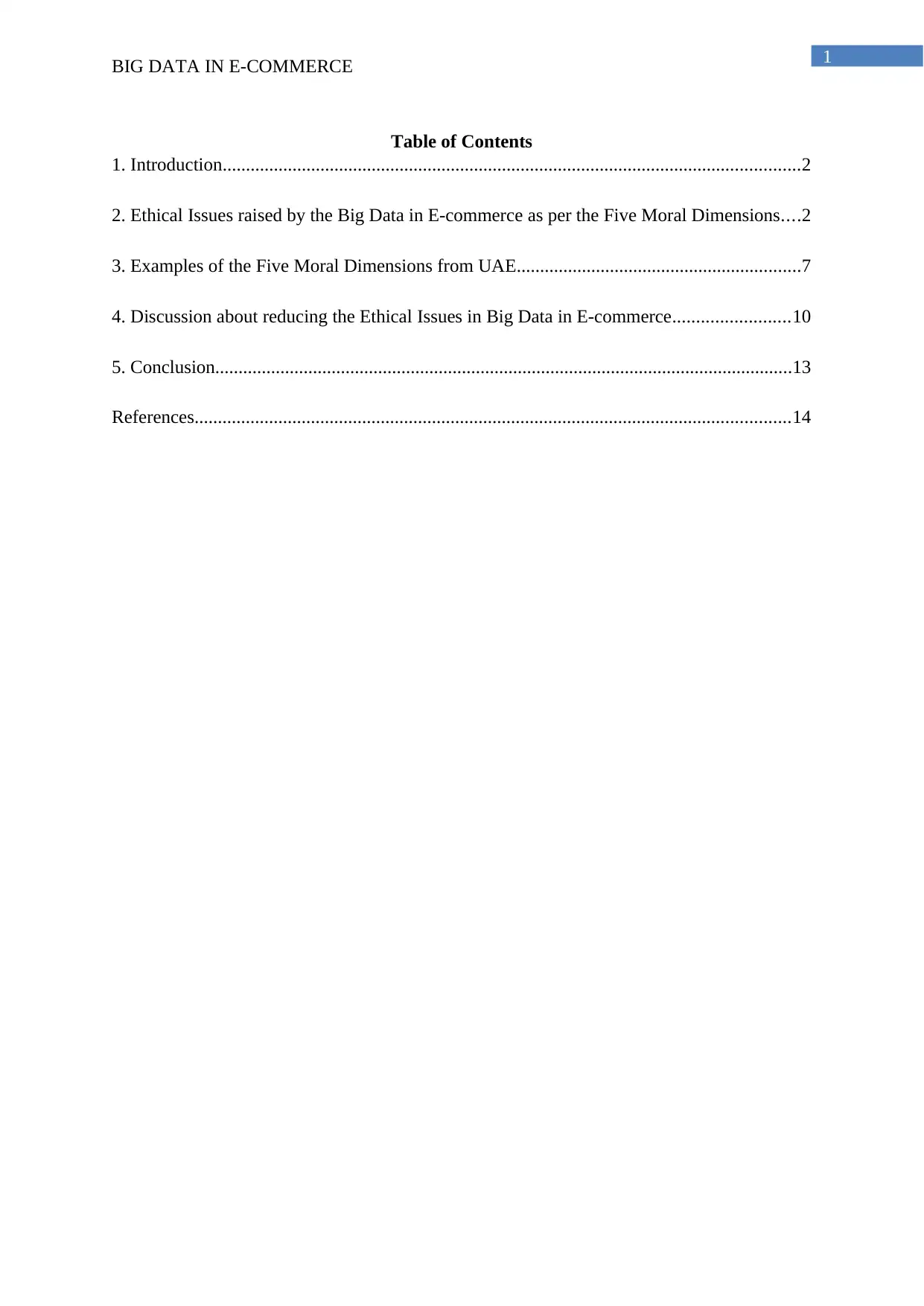
1
BIG DATA IN E-COMMERCE
Table of Contents
1. Introduction............................................................................................................................2
2. Ethical Issues raised by the Big Data in E-commerce as per the Five Moral Dimensions....2
3. Examples of the Five Moral Dimensions from UAE.............................................................7
4. Discussion about reducing the Ethical Issues in Big Data in E-commerce.........................10
5. Conclusion............................................................................................................................13
References................................................................................................................................14
BIG DATA IN E-COMMERCE
Table of Contents
1. Introduction............................................................................................................................2
2. Ethical Issues raised by the Big Data in E-commerce as per the Five Moral Dimensions....2
3. Examples of the Five Moral Dimensions from UAE.............................................................7
4. Discussion about reducing the Ethical Issues in Big Data in E-commerce.........................10
5. Conclusion............................................................................................................................13
References................................................................................................................................14
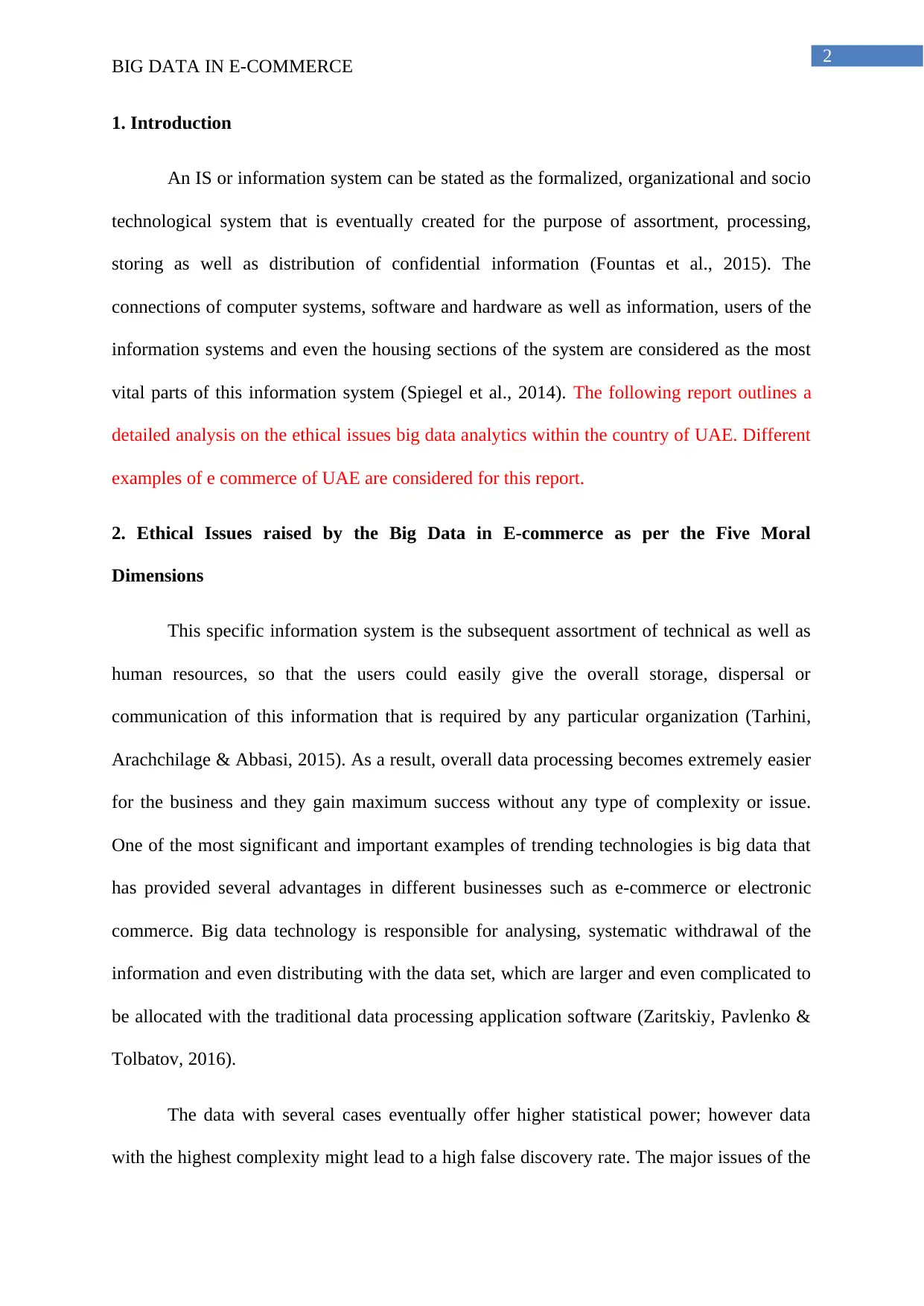
2
BIG DATA IN E-COMMERCE
1. Introduction
An IS or information system can be stated as the formalized, organizational and socio
technological system that is eventually created for the purpose of assortment, processing,
storing as well as distribution of confidential information (Fountas et al., 2015). The
connections of computer systems, software and hardware as well as information, users of the
information systems and even the housing sections of the system are considered as the most
vital parts of this information system (Spiegel et al., 2014). The following report outlines a
detailed analysis on the ethical issues big data analytics within the country of UAE. Different
examples of e commerce of UAE are considered for this report.
2. Ethical Issues raised by the Big Data in E-commerce as per the Five Moral
Dimensions
This specific information system is the subsequent assortment of technical as well as
human resources, so that the users could easily give the overall storage, dispersal or
communication of this information that is required by any particular organization (Tarhini,
Arachchilage & Abbasi, 2015). As a result, overall data processing becomes extremely easier
for the business and they gain maximum success without any type of complexity or issue.
One of the most significant and important examples of trending technologies is big data that
has provided several advantages in different businesses such as e-commerce or electronic
commerce. Big data technology is responsible for analysing, systematic withdrawal of the
information and even distributing with the data set, which are larger and even complicated to
be allocated with the traditional data processing application software (Zaritskiy, Pavlenko &
Tolbatov, 2016).
The data with several cases eventually offer higher statistical power; however data
with the highest complexity might lead to a high false discovery rate. The major issues of the
BIG DATA IN E-COMMERCE
1. Introduction
An IS or information system can be stated as the formalized, organizational and socio
technological system that is eventually created for the purpose of assortment, processing,
storing as well as distribution of confidential information (Fountas et al., 2015). The
connections of computer systems, software and hardware as well as information, users of the
information systems and even the housing sections of the system are considered as the most
vital parts of this information system (Spiegel et al., 2014). The following report outlines a
detailed analysis on the ethical issues big data analytics within the country of UAE. Different
examples of e commerce of UAE are considered for this report.
2. Ethical Issues raised by the Big Data in E-commerce as per the Five Moral
Dimensions
This specific information system is the subsequent assortment of technical as well as
human resources, so that the users could easily give the overall storage, dispersal or
communication of this information that is required by any particular organization (Tarhini,
Arachchilage & Abbasi, 2015). As a result, overall data processing becomes extremely easier
for the business and they gain maximum success without any type of complexity or issue.
One of the most significant and important examples of trending technologies is big data that
has provided several advantages in different businesses such as e-commerce or electronic
commerce. Big data technology is responsible for analysing, systematic withdrawal of the
information and even distributing with the data set, which are larger and even complicated to
be allocated with the traditional data processing application software (Zaritskiy, Pavlenko &
Tolbatov, 2016).
The data with several cases eventually offer higher statistical power; however data
with the highest complexity might lead to a high false discovery rate. The major issues of the
⊘ This is a preview!⊘
Do you want full access?
Subscribe today to unlock all pages.

Trusted by 1+ million students worldwide
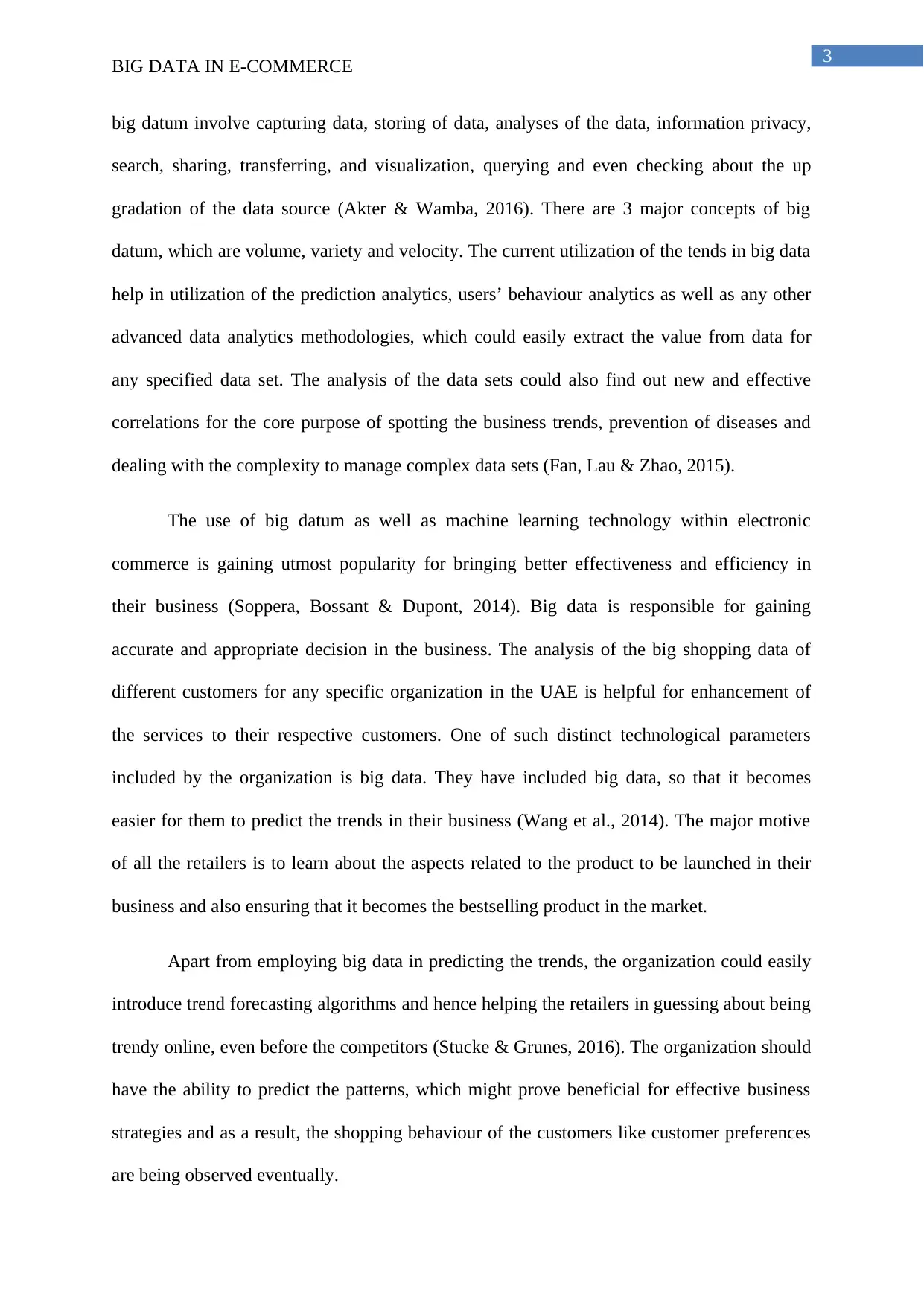
3
BIG DATA IN E-COMMERCE
big datum involve capturing data, storing of data, analyses of the data, information privacy,
search, sharing, transferring, and visualization, querying and even checking about the up
gradation of the data source (Akter & Wamba, 2016). There are 3 major concepts of big
datum, which are volume, variety and velocity. The current utilization of the tends in big data
help in utilization of the prediction analytics, users’ behaviour analytics as well as any other
advanced data analytics methodologies, which could easily extract the value from data for
any specified data set. The analysis of the data sets could also find out new and effective
correlations for the core purpose of spotting the business trends, prevention of diseases and
dealing with the complexity to manage complex data sets (Fan, Lau & Zhao, 2015).
The use of big datum as well as machine learning technology within electronic
commerce is gaining utmost popularity for bringing better effectiveness and efficiency in
their business (Soppera, Bossant & Dupont, 2014). Big data is responsible for gaining
accurate and appropriate decision in the business. The analysis of the big shopping data of
different customers for any specific organization in the UAE is helpful for enhancement of
the services to their respective customers. One of such distinct technological parameters
included by the organization is big data. They have included big data, so that it becomes
easier for them to predict the trends in their business (Wang et al., 2014). The major motive
of all the retailers is to learn about the aspects related to the product to be launched in their
business and also ensuring that it becomes the bestselling product in the market.
Apart from employing big data in predicting the trends, the organization could easily
introduce trend forecasting algorithms and hence helping the retailers in guessing about being
trendy online, even before the competitors (Stucke & Grunes, 2016). The organization should
have the ability to predict the patterns, which might prove beneficial for effective business
strategies and as a result, the shopping behaviour of the customers like customer preferences
are being observed eventually.
BIG DATA IN E-COMMERCE
big datum involve capturing data, storing of data, analyses of the data, information privacy,
search, sharing, transferring, and visualization, querying and even checking about the up
gradation of the data source (Akter & Wamba, 2016). There are 3 major concepts of big
datum, which are volume, variety and velocity. The current utilization of the tends in big data
help in utilization of the prediction analytics, users’ behaviour analytics as well as any other
advanced data analytics methodologies, which could easily extract the value from data for
any specified data set. The analysis of the data sets could also find out new and effective
correlations for the core purpose of spotting the business trends, prevention of diseases and
dealing with the complexity to manage complex data sets (Fan, Lau & Zhao, 2015).
The use of big datum as well as machine learning technology within electronic
commerce is gaining utmost popularity for bringing better effectiveness and efficiency in
their business (Soppera, Bossant & Dupont, 2014). Big data is responsible for gaining
accurate and appropriate decision in the business. The analysis of the big shopping data of
different customers for any specific organization in the UAE is helpful for enhancement of
the services to their respective customers. One of such distinct technological parameters
included by the organization is big data. They have included big data, so that it becomes
easier for them to predict the trends in their business (Wang et al., 2014). The major motive
of all the retailers is to learn about the aspects related to the product to be launched in their
business and also ensuring that it becomes the bestselling product in the market.
Apart from employing big data in predicting the trends, the organization could easily
introduce trend forecasting algorithms and hence helping the retailers in guessing about being
trendy online, even before the competitors (Stucke & Grunes, 2016). The organization should
have the ability to predict the patterns, which might prove beneficial for effective business
strategies and as a result, the shopping behaviour of the customers like customer preferences
are being observed eventually.
Paraphrase This Document
Need a fresh take? Get an instant paraphrase of this document with our AI Paraphraser
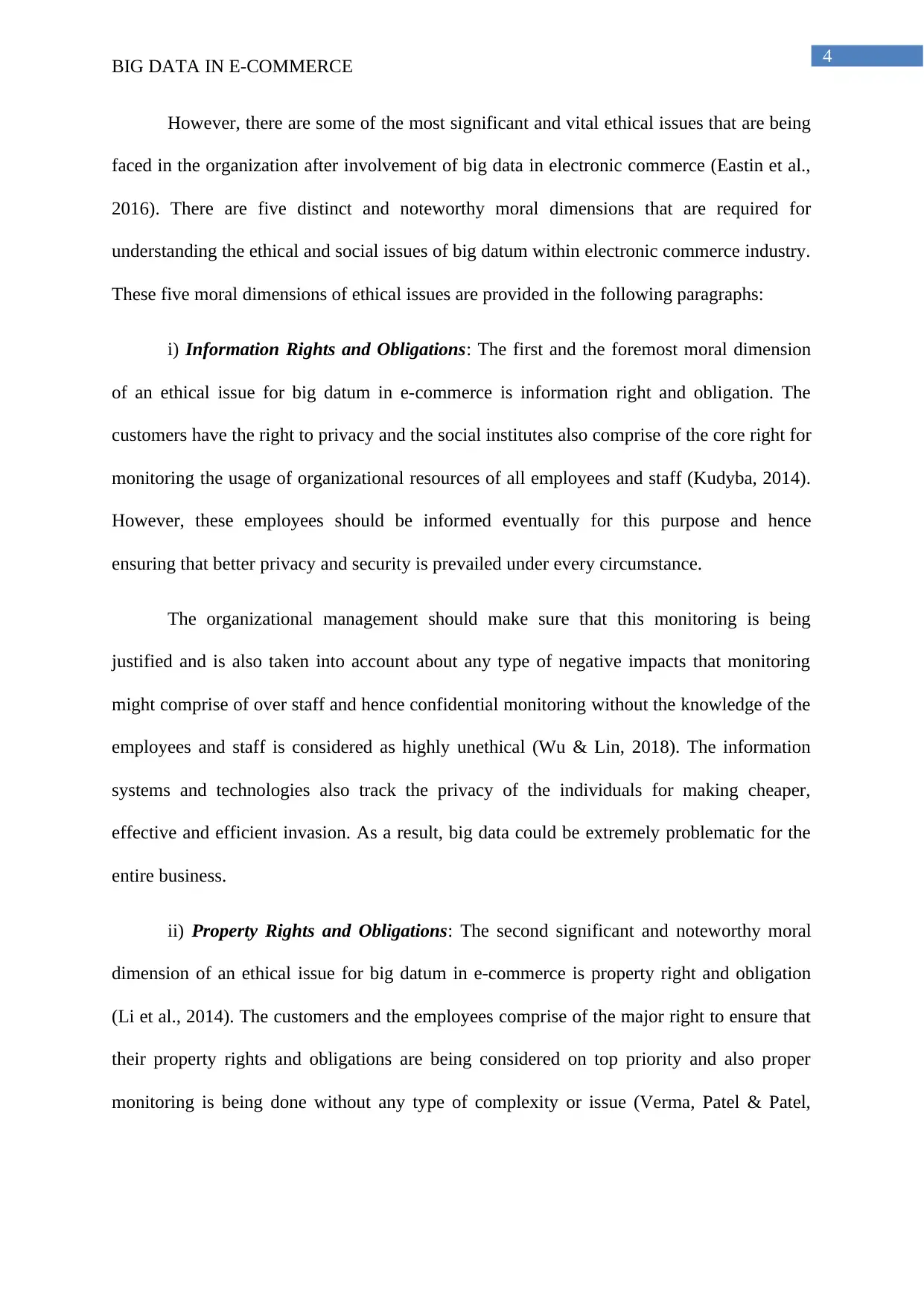
4
BIG DATA IN E-COMMERCE
However, there are some of the most significant and vital ethical issues that are being
faced in the organization after involvement of big data in electronic commerce (Eastin et al.,
2016). There are five distinct and noteworthy moral dimensions that are required for
understanding the ethical and social issues of big datum within electronic commerce industry.
These five moral dimensions of ethical issues are provided in the following paragraphs:
i) Information Rights and Obligations: The first and the foremost moral dimension
of an ethical issue for big datum in e-commerce is information right and obligation. The
customers have the right to privacy and the social institutes also comprise of the core right for
monitoring the usage of organizational resources of all employees and staff (Kudyba, 2014).
However, these employees should be informed eventually for this purpose and hence
ensuring that better privacy and security is prevailed under every circumstance.
The organizational management should make sure that this monitoring is being
justified and is also taken into account about any type of negative impacts that monitoring
might comprise of over staff and hence confidential monitoring without the knowledge of the
employees and staff is considered as highly unethical (Wu & Lin, 2018). The information
systems and technologies also track the privacy of the individuals for making cheaper,
effective and efficient invasion. As a result, big data could be extremely problematic for the
entire business.
ii) Property Rights and Obligations: The second significant and noteworthy moral
dimension of an ethical issue for big datum in e-commerce is property right and obligation
(Li et al., 2014). The customers and the employees comprise of the major right to ensure that
their property rights and obligations are being considered on top priority and also proper
monitoring is being done without any type of complexity or issue (Verma, Patel & Patel,
BIG DATA IN E-COMMERCE
However, there are some of the most significant and vital ethical issues that are being
faced in the organization after involvement of big data in electronic commerce (Eastin et al.,
2016). There are five distinct and noteworthy moral dimensions that are required for
understanding the ethical and social issues of big datum within electronic commerce industry.
These five moral dimensions of ethical issues are provided in the following paragraphs:
i) Information Rights and Obligations: The first and the foremost moral dimension
of an ethical issue for big datum in e-commerce is information right and obligation. The
customers have the right to privacy and the social institutes also comprise of the core right for
monitoring the usage of organizational resources of all employees and staff (Kudyba, 2014).
However, these employees should be informed eventually for this purpose and hence
ensuring that better privacy and security is prevailed under every circumstance.
The organizational management should make sure that this monitoring is being
justified and is also taken into account about any type of negative impacts that monitoring
might comprise of over staff and hence confidential monitoring without the knowledge of the
employees and staff is considered as highly unethical (Wu & Lin, 2018). The information
systems and technologies also track the privacy of the individuals for making cheaper,
effective and efficient invasion. As a result, big data could be extremely problematic for the
entire business.
ii) Property Rights and Obligations: The second significant and noteworthy moral
dimension of an ethical issue for big datum in e-commerce is property right and obligation
(Li et al., 2014). The customers and the employees comprise of the major right to ensure that
their property rights and obligations are being considered on top priority and also proper
monitoring is being done without any type of complexity or issue (Verma, Patel & Patel,
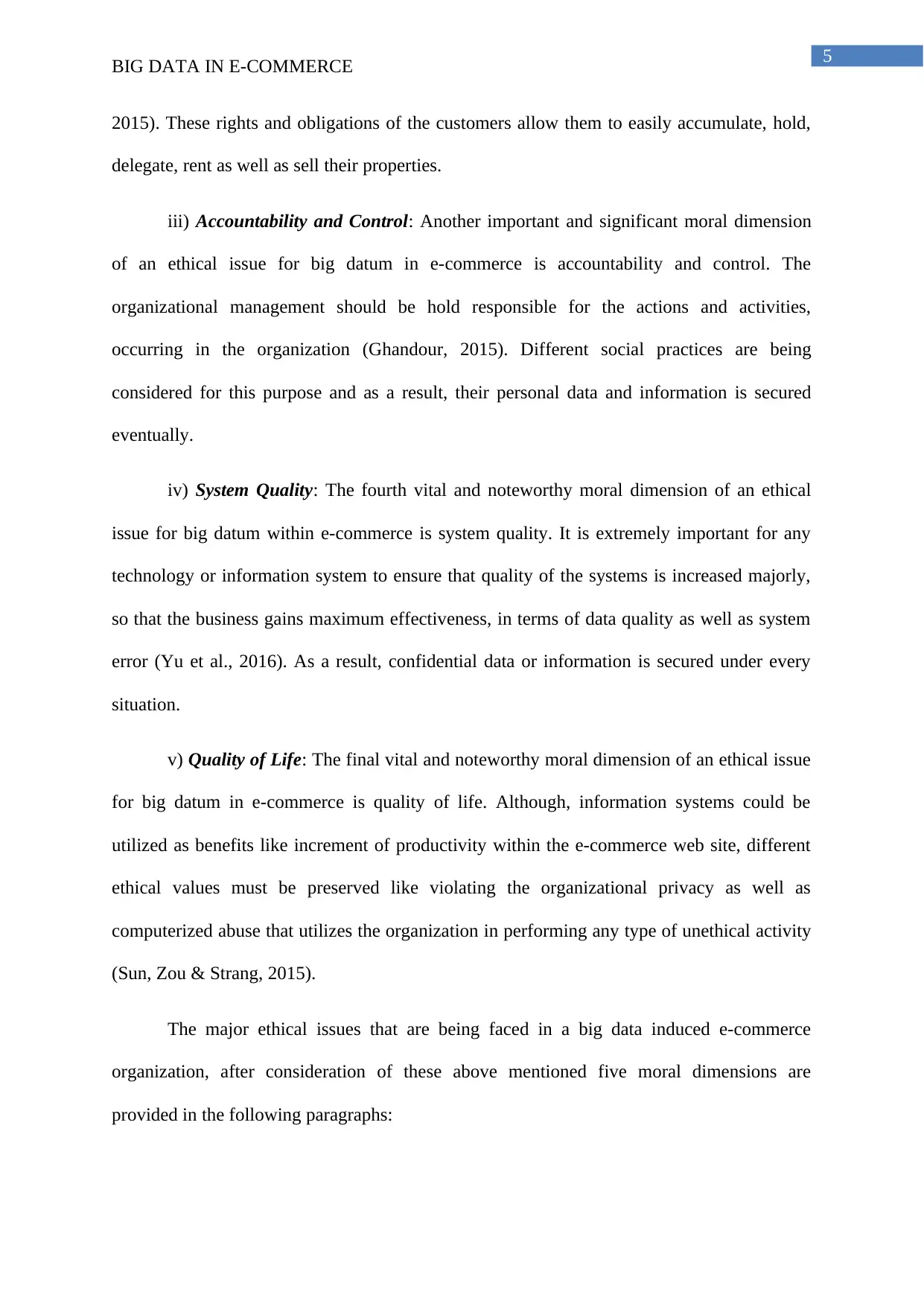
5
BIG DATA IN E-COMMERCE
2015). These rights and obligations of the customers allow them to easily accumulate, hold,
delegate, rent as well as sell their properties.
iii) Accountability and Control: Another important and significant moral dimension
of an ethical issue for big datum in e-commerce is accountability and control. The
organizational management should be hold responsible for the actions and activities,
occurring in the organization (Ghandour, 2015). Different social practices are being
considered for this purpose and as a result, their personal data and information is secured
eventually.
iv) System Quality: The fourth vital and noteworthy moral dimension of an ethical
issue for big datum within e-commerce is system quality. It is extremely important for any
technology or information system to ensure that quality of the systems is increased majorly,
so that the business gains maximum effectiveness, in terms of data quality as well as system
error (Yu et al., 2016). As a result, confidential data or information is secured under every
situation.
v) Quality of Life: The final vital and noteworthy moral dimension of an ethical issue
for big datum in e-commerce is quality of life. Although, information systems could be
utilized as benefits like increment of productivity within the e-commerce web site, different
ethical values must be preserved like violating the organizational privacy as well as
computerized abuse that utilizes the organization in performing any type of unethical activity
(Sun, Zou & Strang, 2015).
The major ethical issues that are being faced in a big data induced e-commerce
organization, after consideration of these above mentioned five moral dimensions are
provided in the following paragraphs:
BIG DATA IN E-COMMERCE
2015). These rights and obligations of the customers allow them to easily accumulate, hold,
delegate, rent as well as sell their properties.
iii) Accountability and Control: Another important and significant moral dimension
of an ethical issue for big datum in e-commerce is accountability and control. The
organizational management should be hold responsible for the actions and activities,
occurring in the organization (Ghandour, 2015). Different social practices are being
considered for this purpose and as a result, their personal data and information is secured
eventually.
iv) System Quality: The fourth vital and noteworthy moral dimension of an ethical
issue for big datum within e-commerce is system quality. It is extremely important for any
technology or information system to ensure that quality of the systems is increased majorly,
so that the business gains maximum effectiveness, in terms of data quality as well as system
error (Yu et al., 2016). As a result, confidential data or information is secured under every
situation.
v) Quality of Life: The final vital and noteworthy moral dimension of an ethical issue
for big datum in e-commerce is quality of life. Although, information systems could be
utilized as benefits like increment of productivity within the e-commerce web site, different
ethical values must be preserved like violating the organizational privacy as well as
computerized abuse that utilizes the organization in performing any type of unethical activity
(Sun, Zou & Strang, 2015).
The major ethical issues that are being faced in a big data induced e-commerce
organization, after consideration of these above mentioned five moral dimensions are
provided in the following paragraphs:
⊘ This is a preview!⊘
Do you want full access?
Subscribe today to unlock all pages.

Trusted by 1+ million students worldwide
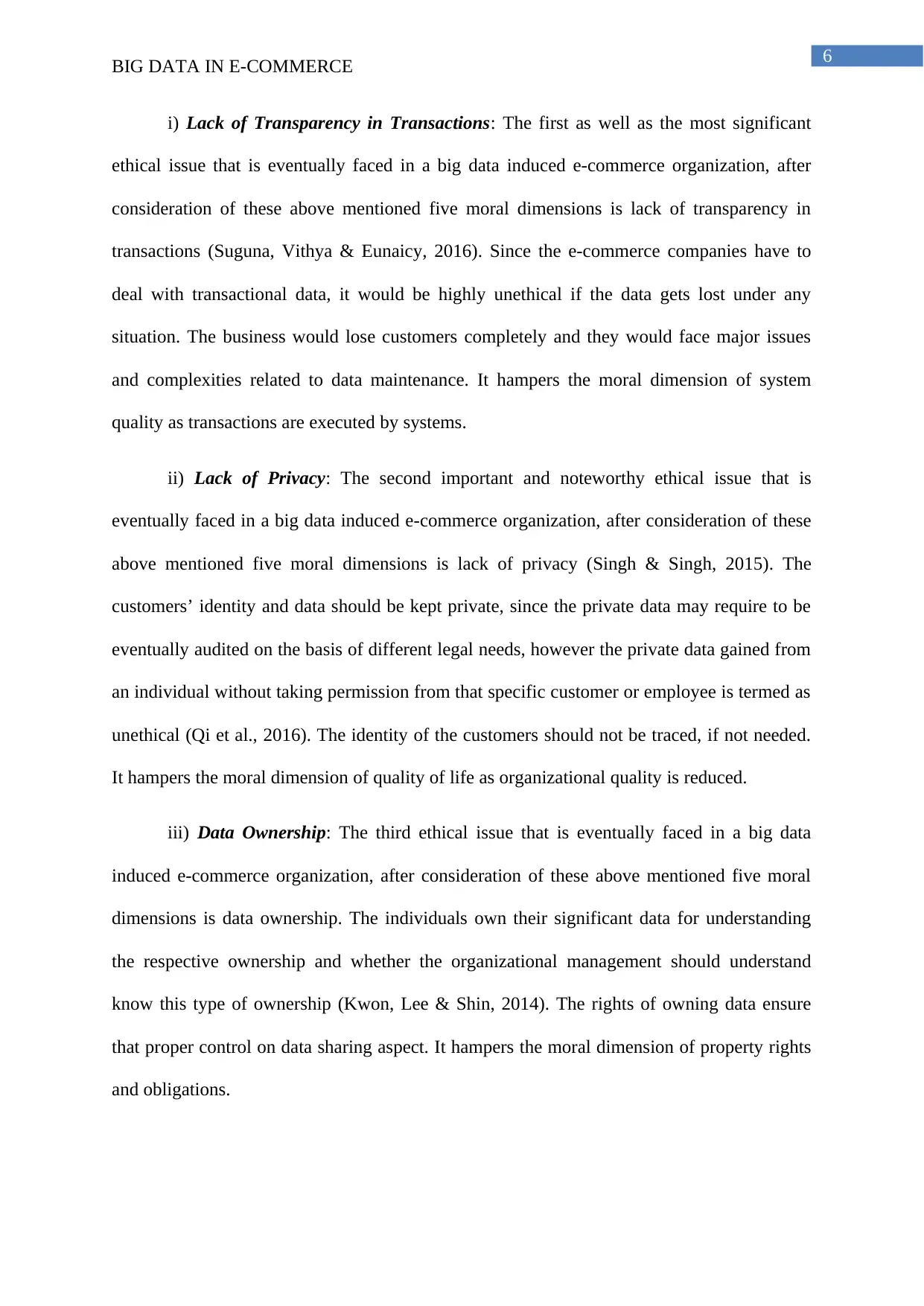
6
BIG DATA IN E-COMMERCE
i) Lack of Transparency in Transactions: The first as well as the most significant
ethical issue that is eventually faced in a big data induced e-commerce organization, after
consideration of these above mentioned five moral dimensions is lack of transparency in
transactions (Suguna, Vithya & Eunaicy, 2016). Since the e-commerce companies have to
deal with transactional data, it would be highly unethical if the data gets lost under any
situation. The business would lose customers completely and they would face major issues
and complexities related to data maintenance. It hampers the moral dimension of system
quality as transactions are executed by systems.
ii) Lack of Privacy: The second important and noteworthy ethical issue that is
eventually faced in a big data induced e-commerce organization, after consideration of these
above mentioned five moral dimensions is lack of privacy (Singh & Singh, 2015). The
customers’ identity and data should be kept private, since the private data may require to be
eventually audited on the basis of different legal needs, however the private data gained from
an individual without taking permission from that specific customer or employee is termed as
unethical (Qi et al., 2016). The identity of the customers should not be traced, if not needed.
It hampers the moral dimension of quality of life as organizational quality is reduced.
iii) Data Ownership: The third ethical issue that is eventually faced in a big data
induced e-commerce organization, after consideration of these above mentioned five moral
dimensions is data ownership. The individuals own their significant data for understanding
the respective ownership and whether the organizational management should understand
know this type of ownership (Kwon, Lee & Shin, 2014). The rights of owning data ensure
that proper control on data sharing aspect. It hampers the moral dimension of property rights
and obligations.
BIG DATA IN E-COMMERCE
i) Lack of Transparency in Transactions: The first as well as the most significant
ethical issue that is eventually faced in a big data induced e-commerce organization, after
consideration of these above mentioned five moral dimensions is lack of transparency in
transactions (Suguna, Vithya & Eunaicy, 2016). Since the e-commerce companies have to
deal with transactional data, it would be highly unethical if the data gets lost under any
situation. The business would lose customers completely and they would face major issues
and complexities related to data maintenance. It hampers the moral dimension of system
quality as transactions are executed by systems.
ii) Lack of Privacy: The second important and noteworthy ethical issue that is
eventually faced in a big data induced e-commerce organization, after consideration of these
above mentioned five moral dimensions is lack of privacy (Singh & Singh, 2015). The
customers’ identity and data should be kept private, since the private data may require to be
eventually audited on the basis of different legal needs, however the private data gained from
an individual without taking permission from that specific customer or employee is termed as
unethical (Qi et al., 2016). The identity of the customers should not be traced, if not needed.
It hampers the moral dimension of quality of life as organizational quality is reduced.
iii) Data Ownership: The third ethical issue that is eventually faced in a big data
induced e-commerce organization, after consideration of these above mentioned five moral
dimensions is data ownership. The individuals own their significant data for understanding
the respective ownership and whether the organizational management should understand
know this type of ownership (Kwon, Lee & Shin, 2014). The rights of owning data ensure
that proper control on data sharing aspect. It hampers the moral dimension of property rights
and obligations.
Paraphrase This Document
Need a fresh take? Get an instant paraphrase of this document with our AI Paraphraser
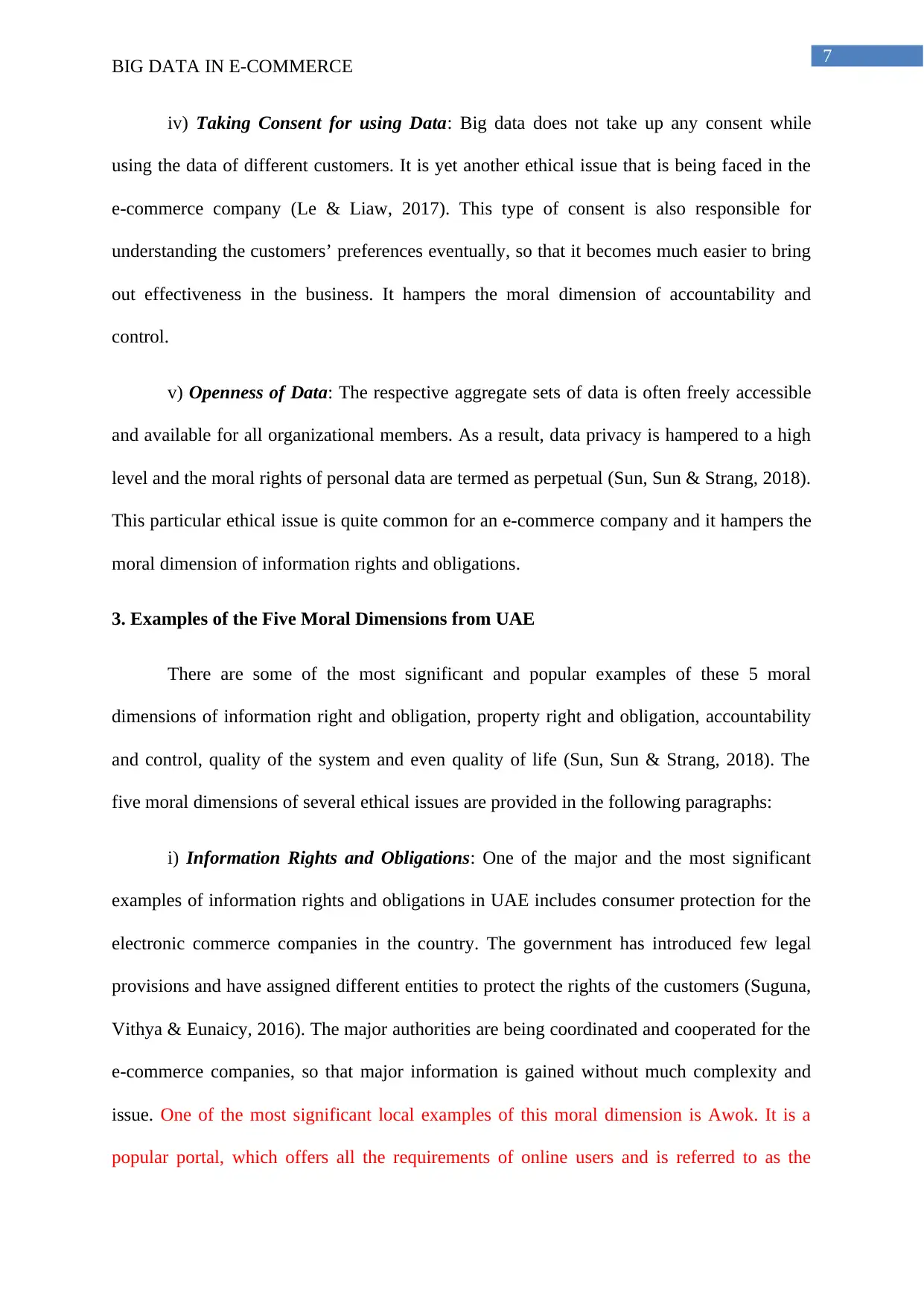
7
BIG DATA IN E-COMMERCE
iv) Taking Consent for using Data: Big data does not take up any consent while
using the data of different customers. It is yet another ethical issue that is being faced in the
e-commerce company (Le & Liaw, 2017). This type of consent is also responsible for
understanding the customers’ preferences eventually, so that it becomes much easier to bring
out effectiveness in the business. It hampers the moral dimension of accountability and
control.
v) Openness of Data: The respective aggregate sets of data is often freely accessible
and available for all organizational members. As a result, data privacy is hampered to a high
level and the moral rights of personal data are termed as perpetual (Sun, Sun & Strang, 2018).
This particular ethical issue is quite common for an e-commerce company and it hampers the
moral dimension of information rights and obligations.
3. Examples of the Five Moral Dimensions from UAE
There are some of the most significant and popular examples of these 5 moral
dimensions of information right and obligation, property right and obligation, accountability
and control, quality of the system and even quality of life (Sun, Sun & Strang, 2018). The
five moral dimensions of several ethical issues are provided in the following paragraphs:
i) Information Rights and Obligations: One of the major and the most significant
examples of information rights and obligations in UAE includes consumer protection for the
electronic commerce companies in the country. The government has introduced few legal
provisions and have assigned different entities to protect the rights of the customers (Suguna,
Vithya & Eunaicy, 2016). The major authorities are being coordinated and cooperated for the
e-commerce companies, so that major information is gained without much complexity and
issue. One of the most significant local examples of this moral dimension is Awok. It is a
popular portal, which offers all the requirements of online users and is referred to as the
BIG DATA IN E-COMMERCE
iv) Taking Consent for using Data: Big data does not take up any consent while
using the data of different customers. It is yet another ethical issue that is being faced in the
e-commerce company (Le & Liaw, 2017). This type of consent is also responsible for
understanding the customers’ preferences eventually, so that it becomes much easier to bring
out effectiveness in the business. It hampers the moral dimension of accountability and
control.
v) Openness of Data: The respective aggregate sets of data is often freely accessible
and available for all organizational members. As a result, data privacy is hampered to a high
level and the moral rights of personal data are termed as perpetual (Sun, Sun & Strang, 2018).
This particular ethical issue is quite common for an e-commerce company and it hampers the
moral dimension of information rights and obligations.
3. Examples of the Five Moral Dimensions from UAE
There are some of the most significant and popular examples of these 5 moral
dimensions of information right and obligation, property right and obligation, accountability
and control, quality of the system and even quality of life (Sun, Sun & Strang, 2018). The
five moral dimensions of several ethical issues are provided in the following paragraphs:
i) Information Rights and Obligations: One of the major and the most significant
examples of information rights and obligations in UAE includes consumer protection for the
electronic commerce companies in the country. The government has introduced few legal
provisions and have assigned different entities to protect the rights of the customers (Suguna,
Vithya & Eunaicy, 2016). The major authorities are being coordinated and cooperated for the
e-commerce companies, so that major information is gained without much complexity and
issue. One of the most significant local examples of this moral dimension is Awok. It is a
popular portal, which offers all the requirements of online users and is referred to as the
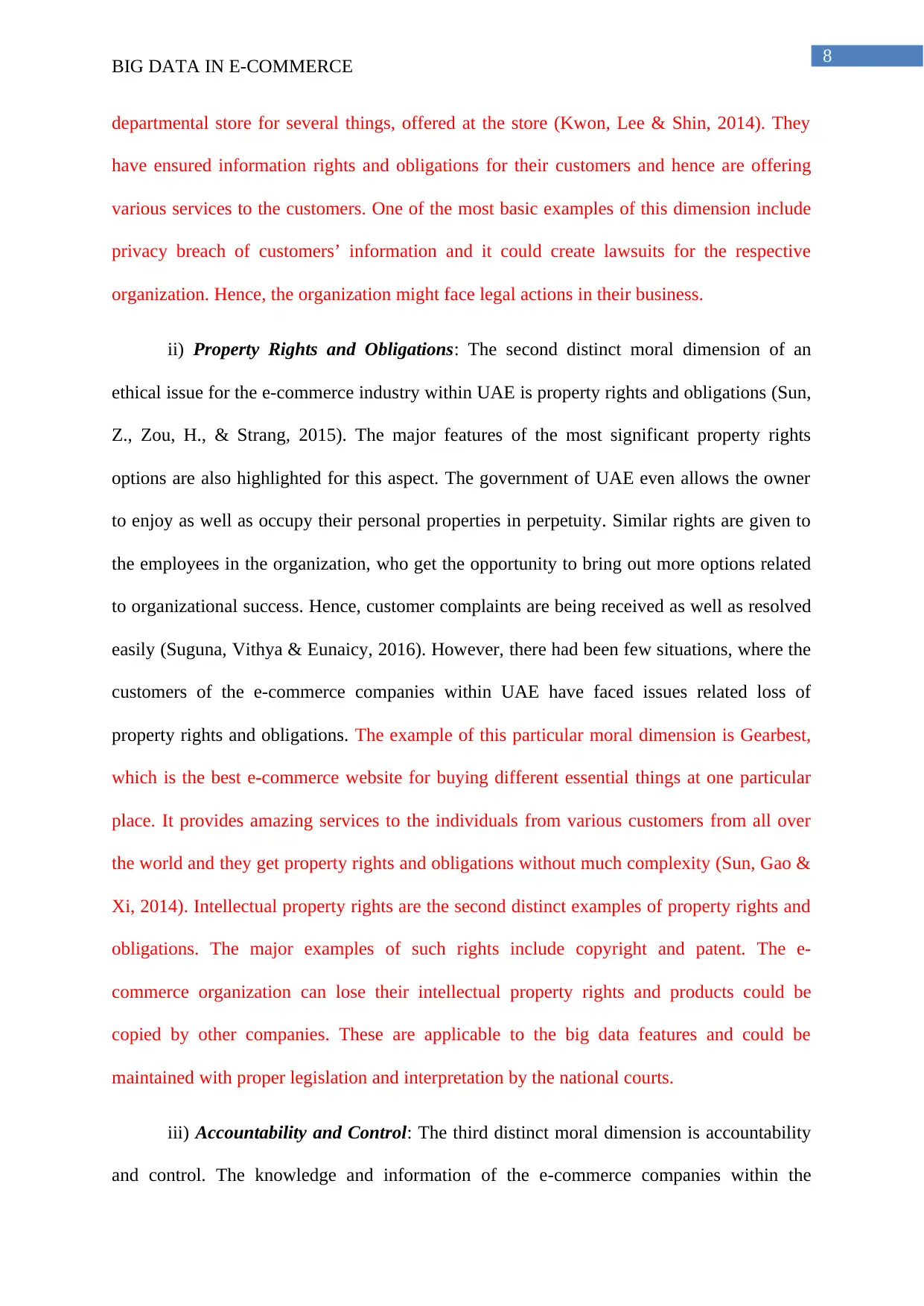
8
BIG DATA IN E-COMMERCE
departmental store for several things, offered at the store (Kwon, Lee & Shin, 2014). They
have ensured information rights and obligations for their customers and hence are offering
various services to the customers. One of the most basic examples of this dimension include
privacy breach of customers’ information and it could create lawsuits for the respective
organization. Hence, the organization might face legal actions in their business.
ii) Property Rights and Obligations: The second distinct moral dimension of an
ethical issue for the e-commerce industry within UAE is property rights and obligations (Sun,
Z., Zou, H., & Strang, 2015). The major features of the most significant property rights
options are also highlighted for this aspect. The government of UAE even allows the owner
to enjoy as well as occupy their personal properties in perpetuity. Similar rights are given to
the employees in the organization, who get the opportunity to bring out more options related
to organizational success. Hence, customer complaints are being received as well as resolved
easily (Suguna, Vithya & Eunaicy, 2016). However, there had been few situations, where the
customers of the e-commerce companies within UAE have faced issues related loss of
property rights and obligations. The example of this particular moral dimension is Gearbest,
which is the best e-commerce website for buying different essential things at one particular
place. It provides amazing services to the individuals from various customers from all over
the world and they get property rights and obligations without much complexity (Sun, Gao &
Xi, 2014). Intellectual property rights are the second distinct examples of property rights and
obligations. The major examples of such rights include copyright and patent. The e-
commerce organization can lose their intellectual property rights and products could be
copied by other companies. These are applicable to the big data features and could be
maintained with proper legislation and interpretation by the national courts.
iii) Accountability and Control: The third distinct moral dimension is accountability
and control. The knowledge and information of the e-commerce companies within the
BIG DATA IN E-COMMERCE
departmental store for several things, offered at the store (Kwon, Lee & Shin, 2014). They
have ensured information rights and obligations for their customers and hence are offering
various services to the customers. One of the most basic examples of this dimension include
privacy breach of customers’ information and it could create lawsuits for the respective
organization. Hence, the organization might face legal actions in their business.
ii) Property Rights and Obligations: The second distinct moral dimension of an
ethical issue for the e-commerce industry within UAE is property rights and obligations (Sun,
Z., Zou, H., & Strang, 2015). The major features of the most significant property rights
options are also highlighted for this aspect. The government of UAE even allows the owner
to enjoy as well as occupy their personal properties in perpetuity. Similar rights are given to
the employees in the organization, who get the opportunity to bring out more options related
to organizational success. Hence, customer complaints are being received as well as resolved
easily (Suguna, Vithya & Eunaicy, 2016). However, there had been few situations, where the
customers of the e-commerce companies within UAE have faced issues related loss of
property rights and obligations. The example of this particular moral dimension is Gearbest,
which is the best e-commerce website for buying different essential things at one particular
place. It provides amazing services to the individuals from various customers from all over
the world and they get property rights and obligations without much complexity (Sun, Gao &
Xi, 2014). Intellectual property rights are the second distinct examples of property rights and
obligations. The major examples of such rights include copyright and patent. The e-
commerce organization can lose their intellectual property rights and products could be
copied by other companies. These are applicable to the big data features and could be
maintained with proper legislation and interpretation by the national courts.
iii) Accountability and Control: The third distinct moral dimension is accountability
and control. The knowledge and information of the e-commerce companies within the
⊘ This is a preview!⊘
Do you want full access?
Subscribe today to unlock all pages.

Trusted by 1+ million students worldwide
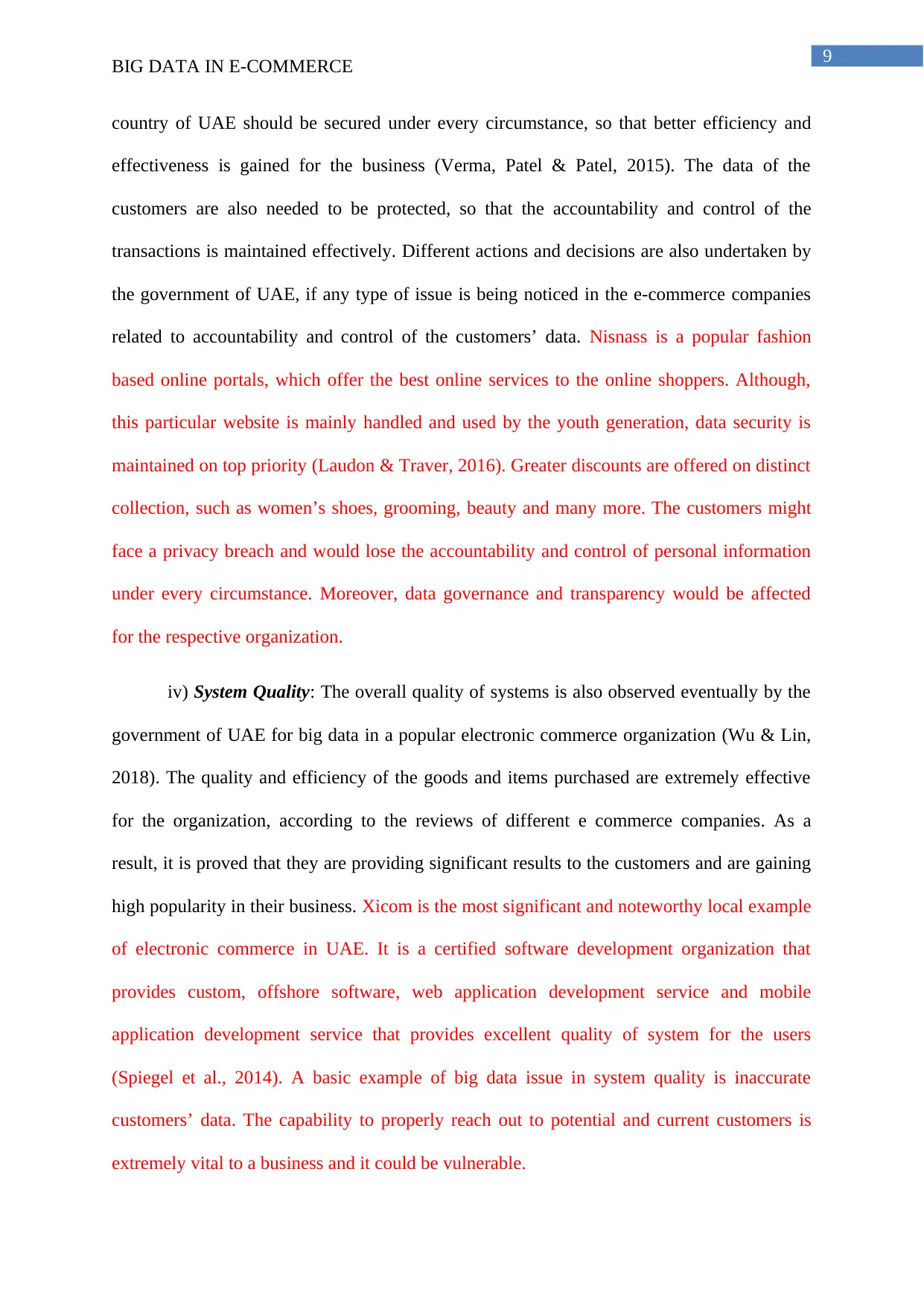
9
BIG DATA IN E-COMMERCE
country of UAE should be secured under every circumstance, so that better efficiency and
effectiveness is gained for the business (Verma, Patel & Patel, 2015). The data of the
customers are also needed to be protected, so that the accountability and control of the
transactions is maintained effectively. Different actions and decisions are also undertaken by
the government of UAE, if any type of issue is being noticed in the e-commerce companies
related to accountability and control of the customers’ data. Nisnass is a popular fashion
based online portals, which offer the best online services to the online shoppers. Although,
this particular website is mainly handled and used by the youth generation, data security is
maintained on top priority (Laudon & Traver, 2016). Greater discounts are offered on distinct
collection, such as women’s shoes, grooming, beauty and many more. The customers might
face a privacy breach and would lose the accountability and control of personal information
under every circumstance. Moreover, data governance and transparency would be affected
for the respective organization.
iv) System Quality: The overall quality of systems is also observed eventually by the
government of UAE for big data in a popular electronic commerce organization (Wu & Lin,
2018). The quality and efficiency of the goods and items purchased are extremely effective
for the organization, according to the reviews of different e commerce companies. As a
result, it is proved that they are providing significant results to the customers and are gaining
high popularity in their business. Xicom is the most significant and noteworthy local example
of electronic commerce in UAE. It is a certified software development organization that
provides custom, offshore software, web application development service and mobile
application development service that provides excellent quality of system for the users
(Spiegel et al., 2014). A basic example of big data issue in system quality is inaccurate
customers’ data. The capability to properly reach out to potential and current customers is
extremely vital to a business and it could be vulnerable.
BIG DATA IN E-COMMERCE
country of UAE should be secured under every circumstance, so that better efficiency and
effectiveness is gained for the business (Verma, Patel & Patel, 2015). The data of the
customers are also needed to be protected, so that the accountability and control of the
transactions is maintained effectively. Different actions and decisions are also undertaken by
the government of UAE, if any type of issue is being noticed in the e-commerce companies
related to accountability and control of the customers’ data. Nisnass is a popular fashion
based online portals, which offer the best online services to the online shoppers. Although,
this particular website is mainly handled and used by the youth generation, data security is
maintained on top priority (Laudon & Traver, 2016). Greater discounts are offered on distinct
collection, such as women’s shoes, grooming, beauty and many more. The customers might
face a privacy breach and would lose the accountability and control of personal information
under every circumstance. Moreover, data governance and transparency would be affected
for the respective organization.
iv) System Quality: The overall quality of systems is also observed eventually by the
government of UAE for big data in a popular electronic commerce organization (Wu & Lin,
2018). The quality and efficiency of the goods and items purchased are extremely effective
for the organization, according to the reviews of different e commerce companies. As a
result, it is proved that they are providing significant results to the customers and are gaining
high popularity in their business. Xicom is the most significant and noteworthy local example
of electronic commerce in UAE. It is a certified software development organization that
provides custom, offshore software, web application development service and mobile
application development service that provides excellent quality of system for the users
(Spiegel et al., 2014). A basic example of big data issue in system quality is inaccurate
customers’ data. The capability to properly reach out to potential and current customers is
extremely vital to a business and it could be vulnerable.
Paraphrase This Document
Need a fresh take? Get an instant paraphrase of this document with our AI Paraphraser
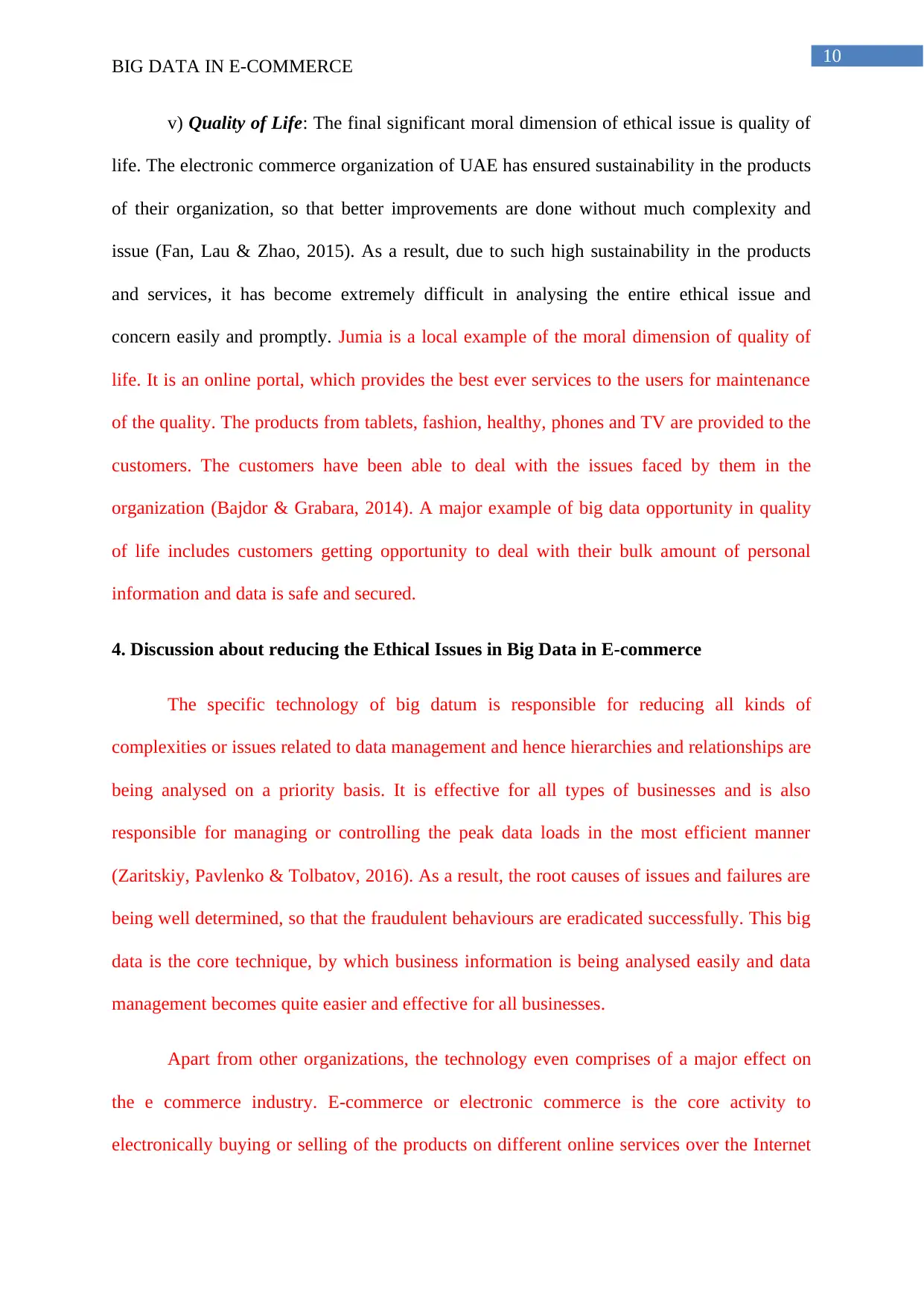
10
BIG DATA IN E-COMMERCE
v) Quality of Life: The final significant moral dimension of ethical issue is quality of
life. The electronic commerce organization of UAE has ensured sustainability in the products
of their organization, so that better improvements are done without much complexity and
issue (Fan, Lau & Zhao, 2015). As a result, due to such high sustainability in the products
and services, it has become extremely difficult in analysing the entire ethical issue and
concern easily and promptly. Jumia is a local example of the moral dimension of quality of
life. It is an online portal, which provides the best ever services to the users for maintenance
of the quality. The products from tablets, fashion, healthy, phones and TV are provided to the
customers. The customers have been able to deal with the issues faced by them in the
organization (Bajdor & Grabara, 2014). A major example of big data opportunity in quality
of life includes customers getting opportunity to deal with their bulk amount of personal
information and data is safe and secured.
4. Discussion about reducing the Ethical Issues in Big Data in E-commerce
The specific technology of big datum is responsible for reducing all kinds of
complexities or issues related to data management and hence hierarchies and relationships are
being analysed on a priority basis. It is effective for all types of businesses and is also
responsible for managing or controlling the peak data loads in the most efficient manner
(Zaritskiy, Pavlenko & Tolbatov, 2016). As a result, the root causes of issues and failures are
being well determined, so that the fraudulent behaviours are eradicated successfully. This big
data is the core technique, by which business information is being analysed easily and data
management becomes quite easier and effective for all businesses.
Apart from other organizations, the technology even comprises of a major effect on
the e commerce industry. E-commerce or electronic commerce is the core activity to
electronically buying or selling of the products on different online services over the Internet
BIG DATA IN E-COMMERCE
v) Quality of Life: The final significant moral dimension of ethical issue is quality of
life. The electronic commerce organization of UAE has ensured sustainability in the products
of their organization, so that better improvements are done without much complexity and
issue (Fan, Lau & Zhao, 2015). As a result, due to such high sustainability in the products
and services, it has become extremely difficult in analysing the entire ethical issue and
concern easily and promptly. Jumia is a local example of the moral dimension of quality of
life. It is an online portal, which provides the best ever services to the users for maintenance
of the quality. The products from tablets, fashion, healthy, phones and TV are provided to the
customers. The customers have been able to deal with the issues faced by them in the
organization (Bajdor & Grabara, 2014). A major example of big data opportunity in quality
of life includes customers getting opportunity to deal with their bulk amount of personal
information and data is safe and secured.
4. Discussion about reducing the Ethical Issues in Big Data in E-commerce
The specific technology of big datum is responsible for reducing all kinds of
complexities or issues related to data management and hence hierarchies and relationships are
being analysed on a priority basis. It is effective for all types of businesses and is also
responsible for managing or controlling the peak data loads in the most efficient manner
(Zaritskiy, Pavlenko & Tolbatov, 2016). As a result, the root causes of issues and failures are
being well determined, so that the fraudulent behaviours are eradicated successfully. This big
data is the core technique, by which business information is being analysed easily and data
management becomes quite easier and effective for all businesses.
Apart from other organizations, the technology even comprises of a major effect on
the e commerce industry. E-commerce or electronic commerce is the core activity to
electronically buying or selling of the products on different online services over the Internet
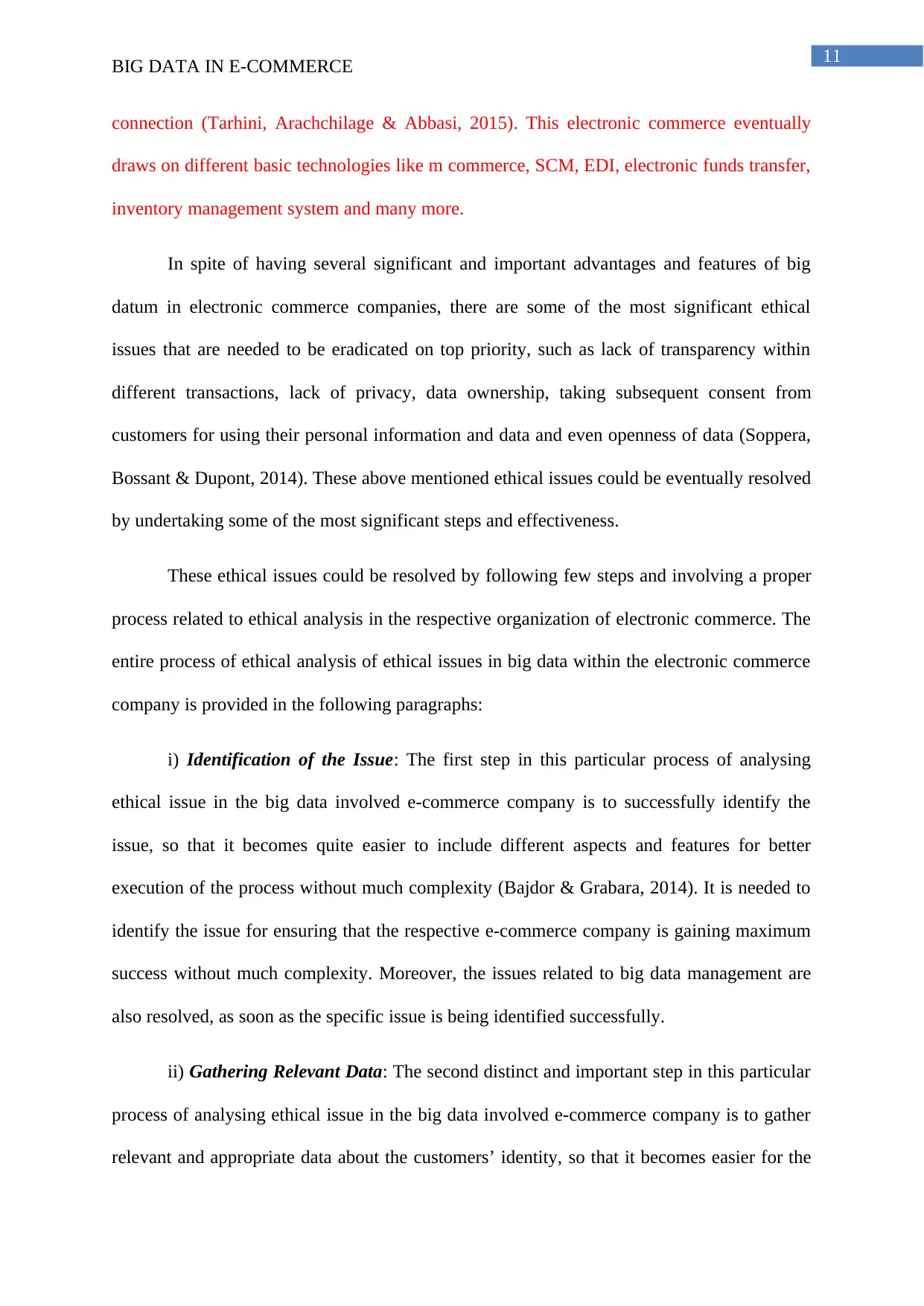
11
BIG DATA IN E-COMMERCE
connection (Tarhini, Arachchilage & Abbasi, 2015). This electronic commerce eventually
draws on different basic technologies like m commerce, SCM, EDI, electronic funds transfer,
inventory management system and many more.
In spite of having several significant and important advantages and features of big
datum in electronic commerce companies, there are some of the most significant ethical
issues that are needed to be eradicated on top priority, such as lack of transparency within
different transactions, lack of privacy, data ownership, taking subsequent consent from
customers for using their personal information and data and even openness of data (Soppera,
Bossant & Dupont, 2014). These above mentioned ethical issues could be eventually resolved
by undertaking some of the most significant steps and effectiveness.
These ethical issues could be resolved by following few steps and involving a proper
process related to ethical analysis in the respective organization of electronic commerce. The
entire process of ethical analysis of ethical issues in big data within the electronic commerce
company is provided in the following paragraphs:
i) Identification of the Issue: The first step in this particular process of analysing
ethical issue in the big data involved e-commerce company is to successfully identify the
issue, so that it becomes quite easier to include different aspects and features for better
execution of the process without much complexity (Bajdor & Grabara, 2014). It is needed to
identify the issue for ensuring that the respective e-commerce company is gaining maximum
success without much complexity. Moreover, the issues related to big data management are
also resolved, as soon as the specific issue is being identified successfully.
ii) Gathering Relevant Data: The second distinct and important step in this particular
process of analysing ethical issue in the big data involved e-commerce company is to gather
relevant and appropriate data about the customers’ identity, so that it becomes easier for the
BIG DATA IN E-COMMERCE
connection (Tarhini, Arachchilage & Abbasi, 2015). This electronic commerce eventually
draws on different basic technologies like m commerce, SCM, EDI, electronic funds transfer,
inventory management system and many more.
In spite of having several significant and important advantages and features of big
datum in electronic commerce companies, there are some of the most significant ethical
issues that are needed to be eradicated on top priority, such as lack of transparency within
different transactions, lack of privacy, data ownership, taking subsequent consent from
customers for using their personal information and data and even openness of data (Soppera,
Bossant & Dupont, 2014). These above mentioned ethical issues could be eventually resolved
by undertaking some of the most significant steps and effectiveness.
These ethical issues could be resolved by following few steps and involving a proper
process related to ethical analysis in the respective organization of electronic commerce. The
entire process of ethical analysis of ethical issues in big data within the electronic commerce
company is provided in the following paragraphs:
i) Identification of the Issue: The first step in this particular process of analysing
ethical issue in the big data involved e-commerce company is to successfully identify the
issue, so that it becomes quite easier to include different aspects and features for better
execution of the process without much complexity (Bajdor & Grabara, 2014). It is needed to
identify the issue for ensuring that the respective e-commerce company is gaining maximum
success without much complexity. Moreover, the issues related to big data management are
also resolved, as soon as the specific issue is being identified successfully.
ii) Gathering Relevant Data: The second distinct and important step in this particular
process of analysing ethical issue in the big data involved e-commerce company is to gather
relevant and appropriate data about the customers’ identity, so that it becomes easier for the
⊘ This is a preview!⊘
Do you want full access?
Subscribe today to unlock all pages.

Trusted by 1+ million students worldwide
1 out of 19
Related Documents
Your All-in-One AI-Powered Toolkit for Academic Success.
+13062052269
info@desklib.com
Available 24*7 on WhatsApp / Email
![[object Object]](/_next/static/media/star-bottom.7253800d.svg)
Unlock your academic potential
Copyright © 2020–2026 A2Z Services. All Rights Reserved. Developed and managed by ZUCOL.



